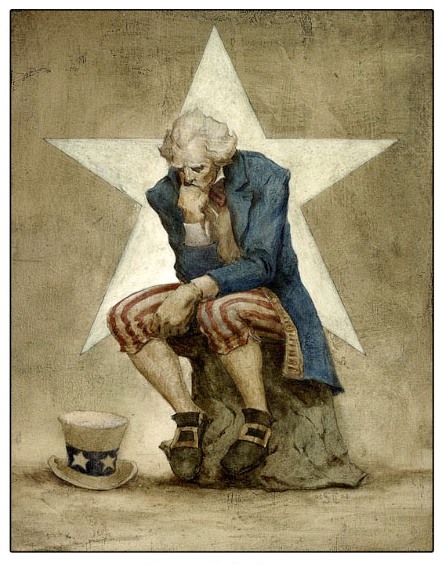What do conservatives stand for?
One popular narrative is that conservatives cling to tradition and resist change. There is an element of truth to this description in that conservatives do value tradition–albeit not for its own sake. Rather, out of the conviction that systems and institutions which have proven themselves over the course of generations should not be hastily cast aside in favor of the untested (and typically ill-fated) vogue. But ultimately, this is a feature of conservativism rather than its essence.
Conservativism is a response to progressivism. The point of divergence between them relates to the (im)perfectability of man–a centuries-long debate with theological origins but profound political implications:
Progressives tend to view history in a more-or-less linear fashion. It is held that as a result of mankind’s essential goodness (or rationality), or else as a result of immutable suprahuman forces, humanity is on a trajectory towards some “end of history” (the notion of progress is incomprehensible absent an end-state. For instance, what would constitute “progress” on an infinite line?).
Insofar as this (implicit or explicit) climax is viewed as utopian in nature (as is usually the case), progressives believe it is their responsibility to hasten this outcome, or even instantiate their ideal in the here-and-now. They typically view governments as a means to achieve these ends, appealing to some conception of the Good which the state is supposed to realize, often by means of some presumed universally-superior mode of societal arrangement. It is this impulse which undergirded the Enlightenment, Marxism, and myriad other revolutionary movements (most of which did not end well) — and its negation forms the basis for conservativism.
Classical Conservativism
Given their rejection of perfectionism, conservatives tend to envision a much smaller role for the state. Unlike libertarians, conservatives emphasize community over the individual. Within communities, people are held to be responsible for, and accountable to, one another (typically by means of traditional values and modes of social organization) without much need for state interference. Civil rights, civil liberties and private property are viewed as essential bulwarks against potential government overreach.
Again, the function of the state is not to promote any particular socio-political arrangement, but instead to protect and promote conditions for communities to arrange themselves as they see fit—principally through the enforcement of agreed-upon rules defining relations between communities, and by providing a forum for resolving disputes.
The state also serves as a vehicle for protecting against outside threats and advancing common interests abroad. However, the scope of these duties is also narrow: governments are not responsible for citizens of other countries—and they have no more of a mandate to advance particular ideals or socio-cultural arrangements internationally than they do domestically. Accordingly, the state should avoid costly, risky or open-ended commitments unless absolutely necessary—and it should similarly abstain from jeopardizing public safety, interests or resources by needlessly threatening, provoking or otherwise antagonizing others.
Other Conservative Strains
Classical conservativism calls for realism and restraint, both domestically and abroad. Unfortunately, most contemporary politicians who describe themselves as “conservative” reflect little of this.
So called “paleo-conservatives” embrace foreign policy restraint, but hold that society should be more-or-less exclusively premised upon Christian, Western-European norms and values (often because they inappropriately conflate pluralism with relativism)–in the process providing cover for people who are xenophobic or intolerant with regards to immigration and diversity. Many associated with this line of thinking view with suspicion and (sometimes) contempt attempts by non-WASPs to form enclaves to protect or promote their own systems of identity and relations — generally holding that minorities have a duty to integrate with the prevailing order instead…a convenient position to take insofar as this order happens to reflect one’s own values and interests.
The self-described “neo-conservatives” have tended to deprioritize so-called ‘social issues,’ but embrace progressive absolutism in terms of free markets, and trend toward authoritarianism in foreign policy and national security matters. They hold in practice, and even on principle, that it is the responsibility of the national government to protect and advance America’s unipolar world order by virtually any means — to include forcibly spreading liberalism around the world, destroying incompatible systems and institutions, and surveilling and disrupting internal dissent by means of pervasive law enforcement and homeland security apparati — all the while deploying Manichean narratives to portray any skepticism of, or resistance to, their agenda as dangerously naïve or outright traitorous. None of this is ‘conservative’ in any traditional sense of the term.
For the sake of political expediency, most conservative libertarians seem to have affiliated themselves with one of these camps (according to their priorities). But more generally, libertarians tend to overemphasize individualism and a universalized, albeit minimal government — with a singular streamlined set of rules. Classical conservativism emphasizes communities instead, and perhaps its fullest realization would be a legally pluralistic system which empowers groups of likeminded citizens to formally arrange themselves as they see fit—to include radically different economic, legal and political processes within their domains–ensuring that all citizens can live in a society which reflects their interests and values, rather than being forced into the zero-sum game of secularism (over who gets to define the supposedly neutral position). Perhaps the closest libertarian approximation of this view is captured in Robert Nozick’s seminal Anarchy, State and Utopia.

